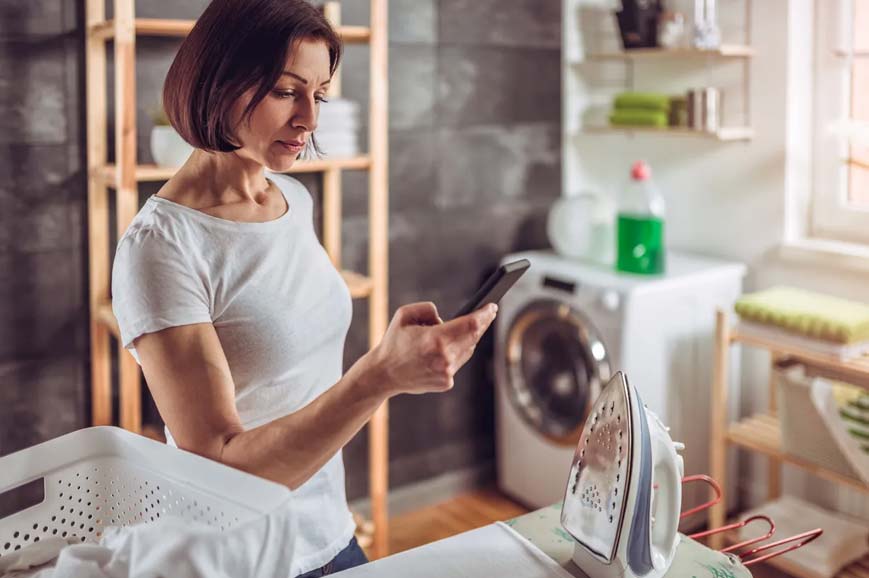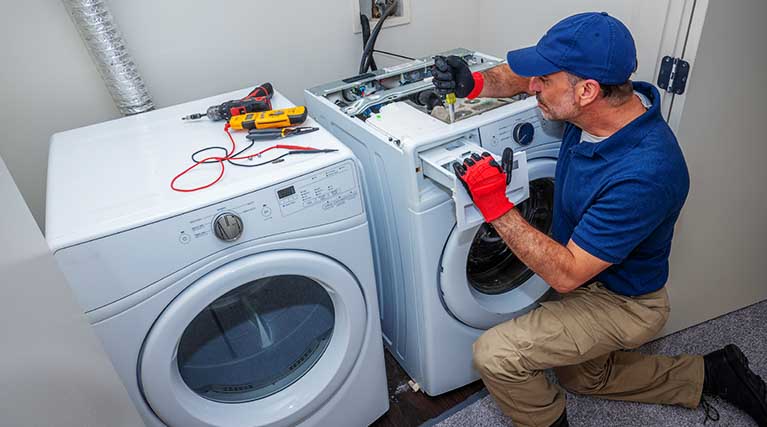Top 10 Dryer Troubleshooting Tricks – Dryer repair Oro Valley Dependable Refrigeration & Appliance Repair Service
Top 10 Dryer Troubleshooting Tricks – Dryer repair Oro Valley Dependable Refrigeration & Appliance Repair Service
Blog Article
The Ultimate Guide to Recognizing Appliance Fixing in the house
When your refrigerator quits cooling or your oven rejects to warm, it can feel overwhelming. Recognizing appliance repair service at home can save you money and time. You'll discover to identify signs and symptoms, make use of vital devices, and adhere to a methodical troubleshooting process. Before you start, there are critical security preventative measures you require to take into account. What are the most typical issues, and how can you repair them? Allow's discover the basics.
Usual Appliance Problems and Their Signs and symptoms
When your devices start acting up, it's crucial to identify the indications beforehand. Neglecting them can cause bigger concerns and expensive fixings. As an example, if your refrigerator isn't cooling down effectively, you may observe warm areas or condensation creating. This might indicate a falling short compressor or a blocked vent.Your dish washer may reveal issues via dirty dishes or unusual sounds throughout cycles. If you listen to grinding or clanking, it's time to investigate.A cleaning maker that will not spin or drain pipes can leave you with soaked washing, recommending a clogged drain or a malfunctioning pump.Lastly, if your oven's temperature level seems off or it takes permanently to pre-heat, you may be handling a defective thermostat. By remaining sharp to these symptoms, you can attend to concerns before they intensify right into significant repair services.
Important Tools for Appliance Repair Work
When you're dealing with appliance repair work in your home, having the right tools is necessary. Fundamental hand devices like screwdrivers and pliers will certainly aid you dismantle and take care of different appliances, while electrical testing gadgets assure you're functioning securely with circuitry. Let's discuss what you need to get going on your repair work trip.
Basic Hand Tools
Having the right devices is essential for efficient device repair work at home. Beginning with a trustworthy screwdriver set, consisting of both flathead and Phillips types, as screws are common in home appliance setting up. Pliers are likewise essential; they aid with gripping, turning, and reducing cables or small elements. A set of needle-nose pliers can get to difficult situations quickly. You'll need a good flexible wrench for tightening up or loosening nuts and screws. An utility blade is helpful for puncturing packaging or insulation. Ultimately, don't forget a sturdy workbench or surface to securely arrange your tools and parts. With these standard hand devices, you'll be well-prepared to deal with most home appliance repair services that come your means.
Electric Testing Gadgets
Together with fundamental hand tools, electrical screening tools play an important duty in device repair service. These devices help you identify electrical issues and guarantee appliances work safely. A multimeter is essential; it measures voltage, existing, and resistance, permitting you to identify troubles quickly. A non-contact voltage tester is another essential, letting you identify live cables without making straight get in touch with, enhancing your safety and security. Clamp meters are great for determining existing flow in wires without separating them, conserving you effort and time. In addition, circuit testers can promptly inspect if electrical outlets are working correctly. By utilizing these tools, you'll simplify your troubleshooting procedure and improve your fixing skills, making device maintenance a whole lot less complicated.
Step-by-Step Guide to Diagnosing Device Issues
When your home appliance acts up, it can be discouraging, yet identifying the problem doesn't have to be overwhelming. You'll find out to determine usual issues and apply reliable repairing strategies. Let's go through the steps to obtain your device back in working order.
Usual Home Appliance Problems

Fixing Techniques Discussed

Fixing Major Kitchen Area Appliances: A Closer Look
Have you ever before asked yourself exactly how to tackle typical concerns with your kitchen area devices? Repairing major cooking area home appliances like refrigerators, ovens, and dish washers can be simpler than you assume. Beginning by identifying the issue-- whether it's a refrigerator not cooling down or a stove that won't warm. Commonly, a basic reset or inspecting the source of power can address the issue.For fridges, clean the condenser coils and check the door seals. If your stove's not heating, check the burner and thermostat. Dishwashers may simply need a tidy filter or a reset to get them back at work. Constantly disconnect the device prior to diving into fixings to ensure your safety.Don' t neglect to consult the user manual for specific repairing suggestions associated with your model. With a little bit of persistence and the right devices, you can confidently tackle device fixings and conserve cash in the process!

Repairing Washing Devices: Tips and Techniques
When your laundry appliances start acting up, it can really feel overwhelming, however repairing them doesn't have to be a problem. Start by checking the power supply. Verify the home appliance is connected in and the electrical outlet is functioning. Next, check the door or cover button; a damaged switch can avoid the maker from operating.For washers, if it's not rotating, inspect for unbalanced lots. Rearranging the garments could solve the concern. If your dryer isn't home heating, tidy the lint filter and inspect the air vent for blockages.Listen for unusual noises; they can indicate a problem. If your device is leaking, inspect the hose pipes for splits or loosened links. Paper any type of mistake codes shown on electronic displays, as they can guide you in identifying the concern. Get in touch with the customer handbook for specific fixing suggestions associated to your design.
Safety Preventative Measures to Take During Repair works
Prior to you start any kind of appliance repair work, it's necessary to prioritize safety and security to stop mishaps or injuries. Initially, disconnect the home appliance or transform off the breaker to assure no power reaches it while you work. Usage shielded tools to decrease the danger of electric shock. Put on safety goggles and handwear covers to protect on your own from sharp edges or debris (Maytag Washing machine repair Dependable Refrigeration & Appliance Repair Service).Make specific your work space is tidy and well-lit, so you can see what you're doing. Keep kids and family pets far from the location to stay clear of distractions and potential risks. If you're taking care of gas appliances, be added cautious; check for leakages before proceeding.Take your time, and do not rush with repairs. If you feel unsure about any action, it's far better to pause and research than to think. Complying with these safety measures will certainly assist develop a much safer atmosphere for your DIY appliance repair work task
When to Call an Expert for Help
Exactly how do you know if it's time to contact a specialist for home appliance repair work? If you have actually attempted fundamental troubleshooting without success, it's a clear indication. For instance, if your home appliance still will not start or shows unusual noises after resetting it, don't wait to seek my website specialist help.When you notice leaks, smoke, or melting smells, focus on safety and call a professional quickly. These concerns can lead to more significant damages or posture dangers to your home.Also, if your home appliance is under guarantee, getting in touch with a professional is frequently the most effective path. They can ensure that fixings won't nullify your warranty, conserving you cash in go to the website the long run.Finally, if you're not sure or uneasy with complex repairs, it's smart to leave it to the professionals. Keep in mind, taking on complicated issues without the appropriate knowledge can cause expensive blunders. Trust fund a specialist when in doubt!
Often Asked Concerns
How Can I Protect Against Appliance Issues in the Future?
To stop device issues in the future, you must do routine maintenance, look for wear and tear, clean filters, and avoid overloading. Staying proactive will certainly assist expand their lifespan and keep them running efficiently.
What Are the A Lot Of Usual DIY Appliance Repair Mistakes?
You may forget security preventative measures, avoid fixing actions, or make use of wrong tools when trying do it yourself home appliance repair services. Hurrying the procedure or overlooking maker guidelines can lead to even more significant problems and expensive errors. Remain patient and notified!
Exactly how Do I Know if a Component Needs Replacement?
You can tell if a component needs replacement by looking for unusual sounds, leaks, or inconsistent performance. If the appliance has a hard time to run properly or reveals noticeable damages, it's most likely time for a replacement.
Can I Utilize Generic Components for Device Repairs?
Yes, you can utilize common parts for device repairs, yet identify they're suitable - Washer dryer repair service Dependable Refrigeration. Common parts could save you cash, yet they could impact efficiency or long life, so evaluate your choices meticulously prior to choosing
What Service Warranties Cover Device Repair Works?
A lot of appliance warranties cover repairs for producing flaws, yet they frequently leave out damages from abuse. Examine your guarantee terms carefully, as some could call for making use of qualified professionals and initial components for protection to stay valid.
Report this page